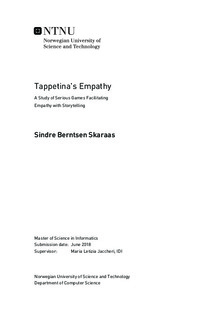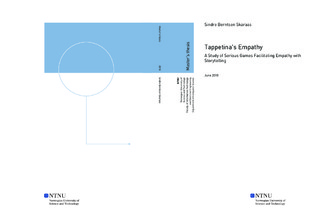| dc.description.abstract | Background: Empathy is the ability for people to understand other people s
motivations, positions, and emotions. This is an important way for people to
relate to each other and much research has been done to find out how serious
games affects empathy. Much of it has, however, been focusing on negative
impacts, which encourage anti-social behavior and reduce empathy. There
is still a notable potential for games to have a positive impact on pro-social
behavior by encouraging and building empathy.
Objective: This thesis investigates how a serious game can affect players
in such a way, through the use of storytelling. First part of this objective
is to do a literature review, which lays out discussions, reports and game
projects on the topic of serious games, empathy and storytelling. The second
part of the objective is to do design and develop a storytelling game. By
having players collaborate on telling a story, the game aims to exercise their
empathic abilities. Each player uses a smartphone which displays the story
structure and grants new cues for building the story together.
Method: The research performed here is design and creation, in which the
main results is the design discussion and the game artifact (including the
digital solution, and the flow of the physical activity). The game is then
evaluated with a second research strategy, a quasi-experiment. This took
place in a workshop trial with 12 participants.
Results: Contributions include the game activity, and the results of the literature
review and the evaluation: Participants responded positively and enjoyed
playing the game. The participants showed different abilities to build
a story, and various reactions that suggested links to empathy.
Limitations: The game is still in an early stage and the quasi-experiment
was too small to accurately generalize. A more streamlined game needs to
be systematically evaluated to a larger audience.
Conclusion: The evaluation showed enough potential to use this approach
to empathy through storytelling. Two scientific papers were written, one of
which was published and the game will be presented at the IDC conference. The project has also been further developed and researched based on the process and design outlined in this thesis, to better facilitate empathic
responses. | |

